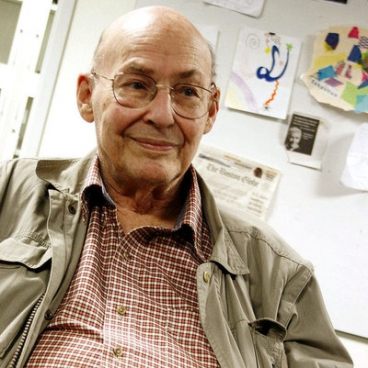| AI's Founding Father Marvin Minsky Wins Award |
| Written by Historian | |||
| Tuesday, 21 January 2014 | |||
|
This year's BBVA Foundation Frontiers of Knowledge Award in Information and Communication Technologies has gone to Marvin Minsky, regarded as a founding father of the field of artificial intelligence. Minsky, who is Professor of Electrical Engineering and He has now become the latest recipient of an award from Spanish-based BBVA Foundation honoring technological contributions considered: "of lasting impact for their originality, theoretical significance and ability to push back the frontiers of the known world." The BBVA's jury singled out Minsky's influential role in defining the field of artificial intelligence and in mentoring many of the leading minds in today’s artificial intelligence community. The citation stated His work on machine learning, on systems integrating robotics, language, perception and planning, as well as on frame-based knowledge representation, shaped the field of artificial intelligence. The BBVA announcement goes on to recall that: Artificial intelligence officially came into being as a discipline at a computer science conference in Dartmouth College (New Hampshire, United States) back in 1956. The founders of the new field were John McCarthy of Stanford University, Allen Newell and Herbert Simon from Carnegie Mellon University, and Minsky himself, the group’s only surviving member. According to MIT News, on learning of the award, which brings a prize of $540,000, Minsky reconfirmed his conviction that one day we will develop machines that will be as smart as humans, but he added “how long this takes will depend on how many people we have working on the right problems. Right now there is a shortage of both researchers and funding.”
The BBVA Foundation Awards were inaugurated in 2008 and the first winner in the the Information and Communication Technologies category was Jacob Ziv, the Israeli computer scientist who co-developed the LZ family lossless data compression algorithms. The next winner, 2009 was engineer and mathematician Thomas Kailath, for a mathematical development permitting the production of increasingly small size chips. Next came Donald E. Knuth for “making computer programming into a science". In 2011 electronic engineer Carver Mead was recognized for enabling the development of the billion-transistor processors lives and the 2012 award went to Lotfi A. Zadeh, for the invention and development of fuzzy logic. In winning the 2013 award Marvin Minsky, now aged 86 and still active in computer science, becomes its sixth recipient.
We regard Marvin Minsky as one of the best known of the revolutionary thinkers of the early days of AI, robotics and computer science. To know more about him, see Marvin Minsky in I Programmer's History section. More Information2013 BBVA Foundation Fontiers of Knowledge Awards Related ArticlesArtificial Intelligence - strong and weak Data compression the dictionary way
To be informed about new articles on I Programmer, install the I Programmer Toolbar, subscribe to the RSS feed, follow us on, Twitter, Facebook, Google+ or Linkedin, or sign up for our weekly newsletter.
Comments
or email your comment to: comments@i-programmer.info
|
|||
| Last Updated ( Thursday, 10 August 2023 ) |



